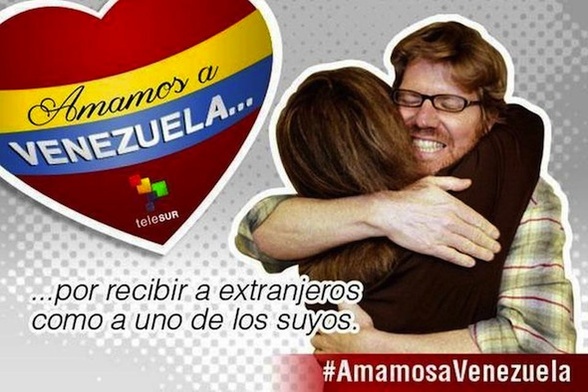MIAMI — The Miami Herald’s Jim Wyss made a startling and surreally ironic discovery Friday morning.
The discovery: Venezuela state-run media was using a picture of him to promote tourism to the troubled South American nation. In the picture he is being hugged by a woman under a slogan that reads, “We love Venezuela …. for welcoming foreigners as one of their own.”

The irony? The picture was taken at Miami International Airport, not Venezuela. And Wyss looked so happy because he had just been released by Venezuelan officials, who detained him for two days in 2013 without letting him call the Herald or telling him why he was being held. Mid-level officials in President Nicolas Maduro’s anti-American government accused him of being a spy for the opposition and promised not to beat him with a flower.
Wyss, a friend of mine from my days at the Herald, wrote about the ordeal after he was released:
Despite my growing anxiety, there were never verbal or physical threats. In fact, the Inspector told me his orders were “not to touch you, even with the petal of a flower.” I was thankful, but wondered what the interview would have been like without those restrictions.
I also worried about my loved ones, family and colleagues. I was long overdue to check in with them. While I knew I wasn’t going to be swatted with a flower, they were left to speculate.
Within an hour after Wyss pointed out the irony of the promo in a blog post for the Herald, Telesur, a TV outlet based in Venezuela, had deleted its tweet about it.
Telesur is an interesting news outlet: Started in Venezuela with government backing in 2005, it is also sponsored by the other left-leaning governments in Latin America—Argentina, Bolivia, Cuba, Nicaragua, and Uruguay. Wyss wrote a story last year about the station when it rolled out an English-language, internet-only channel. (You can read much more about the Venezuelan state’s influence on media in the cover story of CJR’s latest print issue.)
I tried several times to reach someone at the station in Caracas to ask about the promotion, but each time I explained what I was asking about, the call dropped. I was also unable to reach anyone at the Venezuelan embassy in Washington.
But really, what could they have to add?
Wyss noted in his blog post Friday morning: “Considering there are still dozens of people under arrest for protesting last year, perhaps the tag-line is right on.”
Susannah Nesmith is CJR’s correspondent for Florida, Georgia, and Alabama. She is a freelance writer based in Miami with more than 25 years working for regional and national outlets. Follow her on Twitter @susannahnesmith.
